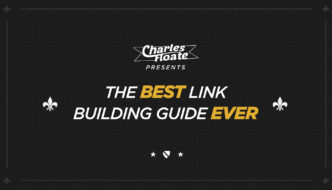A Note From Charles –
Daniel’s been a good friend of mine for many years, and up until recently we were business partners, before a mutual buying out by myself of our agency went through.
He’s one of the best technical / On-Page SEO Experts in the world.. and when we were discussing the ideas he could bring to life for his guest post on my blog, he really liked the idea of pulling apart some of the biggest SEO blogs in the world. Including this one.
In this article, I’m going to be comparing the On-Page SEO of five top SEO Blogs…
Why? Because I generally enjoy doing stuff like this for fun, and I want to find a fun way to demonstrate that even the guys at the top can miss things.
We SEOs all have a tendency to simply get the basic On-Page stuff out of the way, so we can move on to other things, and this can actually be where issues arise.
Optimization stops when you follow a step-by-step methodology for getting those basics complete. So it’s important to make sure you check your sites regularly and have processes in place to catch any errors/issues as they arise.
The Challenge: To find issues and areas that could be improved, objectively speaking, in under 10 minutes each.
We’ll be looking at what they’ve done right, what they could do better and attempt to decide who has done the best job of optimizing their On-Page.
With just 10 minutes to look at each site, how many things can we find to improve?
The Contenders:
CharlesFloate.co.uk – This one was a no-brainer because this guest post is on Charles’ site, also I’ve known Charles for a long time and know that he’s pretty damn good at On-Page.
DiggityMarketing.com – Matt is a well-known blogger with his own On-Page guide, conference and a host of SEO Services. I think we have to consider him as a serious contender.
LionZeal.com – I don’t know Daryl Rosser well, but he seems a cool guy that would be down for a bit of light-hearted fun, I also know a lot of people love what he puts out, myself included.
MatthewWoodward.co.uk – Woodward has been around for a long time, and although I don’t feel like he’s as involved in the SEO community today, he’s still worth taking a look at.
GotchSEO.com – Here’s another guy that’s been around a long time, it’ll be interesting to see how well optimized his site is.
What We’re Checking:
Generally you should be checking for all of the below, and more, but unfortunately we’ve only got 10 minutes per site. So we’re going to try and find as many issues as we can as quickly as possible.
I expect to find some small issues because that’s common on all sites and even experienced SEOs are no exception in my experience of auditing.
We’ll be checking criteria along the lines of what’s below:
- General strategic approach
- Indexed Pages – What pages are indexed that shouldn’t be?
- SSL
- Attribute Usage – Alt tags, Title tags etc.
- Excessive Links – Author Links, Tag Links etc.
- Tag Usage – H1s, H2s etc.
- Additions – Breadcrumbs, Sitemap, Table of Contents etc.
- Mobile Friendliness – Are these sites optimized well for mobile?
- Embeds – Are they using enough images, videos etc?
- Internal & External Links – Are they doing a good job of maximizing their internal and external links?
- Errors – Are there any errors on these sites that can be easily found via ScreamingFrog.
- URL Structure
- Page Titles etc
So, without any further ado, let’s jump into analyzing these sites.
CharlesFloate.co.uk
https://www.youtube.com/watch?v=RfKKg68Hshc
Overall I think that Charles has done a great job on his site, the homepage in my opinion is the best out of a tough group, and while his blog could do with a revamp to be as clean as his homepage, the actual content itself is great.
There are a few pages indexed that maybe shouldn’t be, but since the typical offenders aren’t present I’d say this is more of an oversight. Especially given that his blog has been de-indexed for a long ass time and he probably wasn’t optimizing it much, if at all.
The lack of use of title attributes on navigation links is a particular issue that’s present, that being said he’s the only contender of the three that is properly using Breadcrumbs, which I think in 2018 is one of the most important things you can do.
His On-Page looks solid overall though, so I give him an 8/10.
I’m pretty sure this would be higher if it wasn’t for the issue with being deindexed for ages, and to be honest if he hadn’t been deindexed for ages and was still the way it is, I might have score the site a little lower.
DiggityMarketing.com
https://www.youtube.com/watch?v=gTYsqX5v5VE
Matt has done a solid job with keeping his site bloat free, and I think that although I don’t personally like the homepage as much as the others, it does function well from an SEO standpoint.
His indexing is on point, so he’s made sure he has good control over where and what crawlers are visiting/indexing. He’s also made sure to remove links that aren’t totally necessary for his site, which is great from a crawlability standpoint.
He’s also forgot or opted not to include some important things like a Sitemap link and Breadcrumbs.
One thing I would change is remove /category/ from his URL structure. Sometimes that can be a bad choice on existing sites though, so it’s more of a thing to do right from the beginning. If there aren’t a huge amount of links pointing to those pages it can be a good idea to do it and setup the appropriate .301 redirects even on existing sites.
I give Matt an 8.5/10 for the work he’s done on his site based on the criteria of potential issues that I presented at the beginning.
He doesn’t have a lot of issues with his site at all, and it seems to me as though many of the smaller issues I could find are probably minor oversights at best.
LionZeal.com
https://www.youtube.com/watch?v=WNvlST8NBwY
Daryl has opted for building a simple and bold site, and the design works well. Since most of his content is video based, he’s offered transcripts on most of his articles, which is a must.
He could go further though, and offer the video as well as a well written piece of content that then allows him to further optimize his pages, utilize internal links and so on. This is his main limiting factor. Subjectively I suspect he’s done it for a good reason, but objectively that leaves a lot of “money on the table”.
He also has some common issues such as issues with indexed pages, no title attributes on navigation links, no breadcrumbs or sitemap. There are also some errors, such as a .404 not found error that hasn’t been fixed with an appropriate .301 redirect.
Overall he’s done a good job for what his site is, but because he’s failed a few of the basics criteria we’ve outlined, and missed some golden opportunities to potentially double his traffic. So objectively I have to give him a 6/10 even though I’m aware that subjectively there are probably reasons for why he’s done his site the way he has.
MatthewWoodward.co.uk
https://www.youtube.com/watch?v=-HjoNt5AWek
Matt’s site has a bunch of issues, from excessive links to general poor implementations of tags and attributes.
Matt makes use of things like Breadcrumbs, but again shows no link to his Sitemap. His site is also harder to read on mobile than it should be.
He doesn’t have any immediately obvious indexing issues, which is a good thing for a site of his size. Another thing Matt does pretty well is Internal and External Linking.
Overall I can see that Matt has issues with his “Macro” Optimization, which is to say the way the site works overall, the structure and so on. Whereas his “Micro” Optimization on the individual page or post level is pretty good.
For this reason I’m giving Matt a 6/10.
GotchSEO.com
https://www.youtube.com/watch?v=P6X72wn-uVA
Nathan Gotch has a really well built site, it’s very clean and minimal. It works nicely on mobile, and he’s not using an excessive amount of links.
Where I can see issues with his site is that he’s not using the best alt attributes for images on his homepage, and on his blog, rather than serving up duplicate content he’s opted to have no excerpt at all from the blog posts. This is something I do like doing, except I usually would prefer to create a custom excerpt that then allows me to craft some content that adds relevancy to the post link anchor text. He could also benefit from using a custom excerpt as they can help improve click-through rates.
He’s got a number of indexed pages on Google that shouldn’t be, in his defense he’s clearly .301d these as they no longer exist. However for a site that’s been around as long as his, this should of never become an issue in the first place. Fixing issues is good, but it’s better to never have them in the first place.
The other big issues I can see with his On-Page, are that he’s not really using enough embeds in a lot of his articles. Additionally, there’s not an awful lot of Internal Links or External Links present. He could be doing a lot more there.
There are no breadcrumbs present on the site, and he’s also not got the Sitemap link… Lastly in my opinion he could also optimize his H2s a lot better than he has done considering he wants to rank these articles.
His site is almost the opposite of what we see with Woodward’s. Nathan has a great “Macro” site, but when it comes down to the Micro Optimization he’s still got some improvements he could make.
For these reasons I give Nathan a 6/10.
The Winner

Matt Diggity edges this slightly for me… But let’s face it, they’re all winners here because I’ve just given them a bunch of cool optimizations to work on 😉
What We’ve Learned
Here are some interesting things that I’ve learned doing this small comparison…
- Only 2 of the Bloggers use Breadcrumbs
- Nobody has a Sitemap link in the Footer
- Alt attributes aren’t as optimized as you might expect.
- Nobody is using Title attributes uniformly across their navigation.
- 3 out of 5 bloggers have indexed pages that shouldn’t be.
- There are technical issues on almost all of the sites.
- Each blogger seems to be strong at one type of optimization and a little weak at the other. Which makes sense because we all have individual strengths and weaknesses in our approach.
Conclusion
No matter who you are there are still things you could do to improve your On-Page SEO. I think that even if you can take just 10 minutes out of your day to analyze your site in an objective way that you’ll find a lot of areas for improvement.
You can check out my recent post on The SEO Institute about how I do audits if you’re interested in how I actually do these manual-first audits in an extremely detailed way. I’d also recommend joining my On-Page Optimization Group on Facebook if you’re interested in On-Page SEO.
Lastly, if you’re interested in an audit check out my site Pathtorch > https://pathtorch.com/
I hope you enjoyed this post and it gave you a ton of takeaways to improve your On-Page abilities. If you have any questions, feel free to leave a comment down below.








